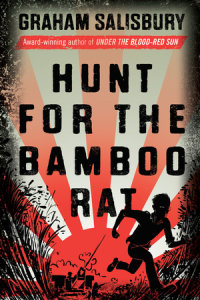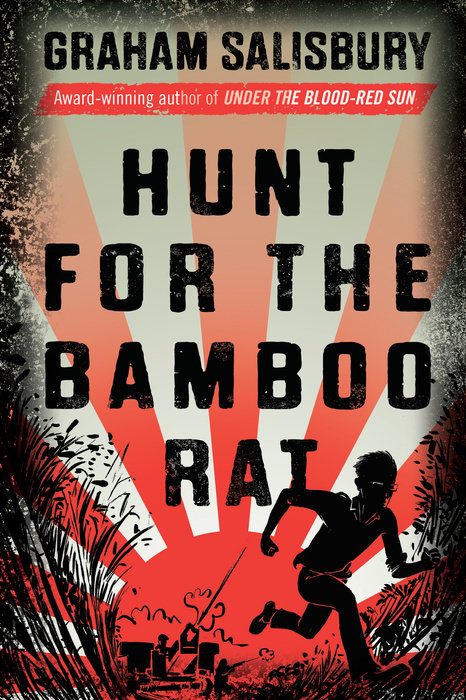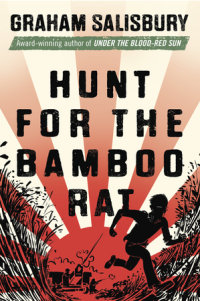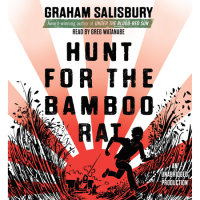Hunt for the Bamboo Rat
Hunt for the Bamboo Rat is a part of the Prisoners of the Empire Series collection.
“A gripping saga of wartime survival.” —Kirkus Reviews, Starred
Based on a true story, this World War II novel by Scott O’Dell Award winner Graham Salisbury tells how Zenji, 17, is sent from Hawaii to the Philippines to spy on the Japanese.
Zenji Watanabe was born in Hawaii. He’s an American, but the Japanese wouldn’t know it by the look of him. And that’s exactly what the US government is counting on.
Because he speaks both English and Japanese perfectly, the army recruits Zenji for a top-secret mission to spy on the Japanese. If they discover his true identity, he’ll be treated as a traitor and executed on the spot.
As World War II boils over in the Pacific, Zenji is caught behind enemy lines. But even though his Japanese heritage is his death warrant, it’s also his key to outwitting the enemy and finding the strength to face the terrors of battle, the savagery of the jungle, and the unspeakable cruelty of war.
The riveting Hunt for the Bamboo Rat is based on a true story and follows in the path of author Graham Salisbury’s other highly acclaimed Prisoners of the Empire titles, which began with the award-winning Under the Blood-Red Sun.
Finalist for:
Nebraska Golden Sower Award
South Carolina Book Awards
"Salisbury has once again crafted a fine novel, based on an actual person, about first-generation Americans of Japanese descent and the clash of culture and national identity that World War II accentuated. . . . The story will leave readers spellbound." —Kirkus Reviews, Starred
"Fast-paced and compelling, this title will be enjoyed by voracious and reluctant readers." —SLJ
"The history is fascinating, and Zenji is a fictional hero readers will long remember." —The Horn Book
An Excerpt fromHunt for the Bamboo Rat
Zenji Watanabe was in the middle of an early-morning daydream as he walked to his job at Honolulu Harbor. He was trying to imagine himself as a Buddhist priest like his teachers at Japanese school when a rat leaped out of a garbage can just ahead, sending the metal lid clanging to the sidewalk.
He jumped back and adjusted his glasses. “Crazy rat!”
Late for work, he was cutting through Chinatown, hoping he could make it without any trouble.
But the rat changed that.
Three Chinese guys sitting on their heels two blocks down looked his way.
“Oh, man,” Zenji whispered.
It was August 1941, and in Honolulu tensions between the Chinese and Japanese had risen like fire-spewing dragons because of what had happened in Nanking, China. In 1937, the Imperial Japanese Army killed over a hundred thousand innocent Chinese civilians. Maybe even more. To Zenji it was a tragedy. But some patriotic Japanese immigrants had publicly cheered Japan’s success. Anger at Japan still smoldered in Chinatown.
The three guys were about his age, seventeen. They seemed as surprised to see him as he was to see them.
One guy had hair that hung past his shoulders. “Hey!” He sprang to his feet.
The others got up, shooting Zenji dirty looks.
Zenji pretended not to see them, and turned casually down the street to his left. The second he was out of sight, he ran.
Hide--an open door, a dark alley, a low window!
Where?
He spotted a rusted fire escape and climbed it, hoping it would hold. One floor up, he punched through a window screen and tumbled into somebody’s bedroom.
He scrambled to his feet and glanced around.
Empty . . . except for the biggest bed he’d ever seen. And a dresser with a huge mirror, a red velvet chair, a nightstand with a frilly lamp.
A hotel?
He edged back up to the window and peeked out. Long-hair guy ran into view.
Zenji stepped back.
“Man,” he whispered. “Now what?”
What would his teacher-priests do in this mess? They believed that if you had compassion for people in your heart, everything would turn out well. Zenji wasn’t so sure about that.
He decided they’d do one of two things: use kendo, their swordsmanship with bamboo sticks, or stand firm and peacefully face the problem.
Zenji didn’t know kendo.
Someone in the street shouted, “He’s here! I smell um.”
The bedroom door flew open and slammed against the wall. A Chinese man the size of a garbage truck stood in the doorway with a baseball bat. He looked hard at Zenji and quickly took in every corner of the room.
Zenji staggered back. “It’s not what you think, mister.”
The big man pointed the bat at him as he came into the room, circling to his right, his eyes never leaving Zenji.
“I didn’t mean to break in. . . . Some guys down on the street chased me. I was just walking to my job.”
The man moved close enough to hammer Zenji’s brains to mush.
Zenji put his palms out, trying to stop him. “I . . . I just got a job at the harbor, and--”
“You know what this place is?” the man snapped. “You really want to bus’ in here? What’s your name?”
Zenji looked for a way out. There wasn’t one. “Zenji . . . Watanabe.”
The big man studied him, then lowered the bat.
He stepped over to the window and looked out. “I don’t see nobody.”
“They’re out there. Three of them. I didn’t do anything to them.”
The big man grunted. “You Japanee, that’s what you did. Come. You gotta get out of Chinatown. Stupid to come here.”
Zenji followed him down the hall. Four young women stuck their heads out from different doors.
“Hey, Jesse, who you got there? What’s going on?”
“Not’ing. Kid got the wrong address.”
Oh, jeez, Zenji thought. Now he knew what this place was.
He tried to smile at the women.
Heat rushed to his face when one blew him a kiss.
Jesse took Zenji out to the street, looking right, then left. He pointed with his chin to three guys crossing toward them, ignoring a honking car.
“That’s them,” Zenji said.
“They jus’ kids.”
“Maybe, but there’s three of them and one of me.”
The three guys strutted around Zenji, staring him down, ignoring Jesse.
Zenji kept his mouth shut.
Be calm. Don’t show fear.
“We go,” Jesse said. “I take you out of here.”
Zenji shook his head. “No. Thanks, but . . . I can take care of this.”
Jesse stared at him. “You crazy?”
“Prob’ly.”
Jesse hesitated, and stepped back.
Long-hair guy blocked the sidewalk. Barefoot, street-dirty feet, khaki pants, tight black T-shirt, a small star tattooed on his left earlobe, and eyes that darted like a lizard.
The two other guys moved in around him. Their faces said You going get hurt, Japanee.
Zenji tried to drag up some Buddhist compassion. These guys are just . . . these guys are . . .
Scary.
Think!
Okay. They hate me. But I don’t have to hate them. Look them in the eye. Show no fear.
Long-Hair grunted. “We going take your head off today, Japanee punk. What you t’ink?”
“I’m not going to fight you.”
Long-Hair leaned into Zenji’s face. “Sissy, you?”
Zenji didn’t blink.
Jesse crossed his arms, and people on the sidewalk watched, silent.
They’re just guys like me, Zenji told himself. No different.
Long-Hair and Zenji stared into each other’s eyes.
Breathe. Long, slow breath.
Think.
He’s just a guy. Got a little sister
A dog.
His mother likes him.
Maybe.
Zenji almost choked on a laugh.
Finally, Long-Hair stepped back. “Pfff. Beat it, Jap punk. Nex’ time we not going be so nice.”
Zenji nodded and eased around the three guys. He wanted to say something back. Friendly.
Don’t push it. Could be they’re just afraid of Jesse.
Zenji nodded to the big guy and walked away.
He glanced back over his shoulder.
Long-Hair ran a finger across his throat.
After he turned the corner, Zenji stopped and took deep breaths. He held his trembling hands out, palms down.
He looked again at the streets of Chinatown in surprise. He was trembling not because he was afraid, but because he’d just discovered something: that smile inside?
It was real.
Dang. Those priests were good.



